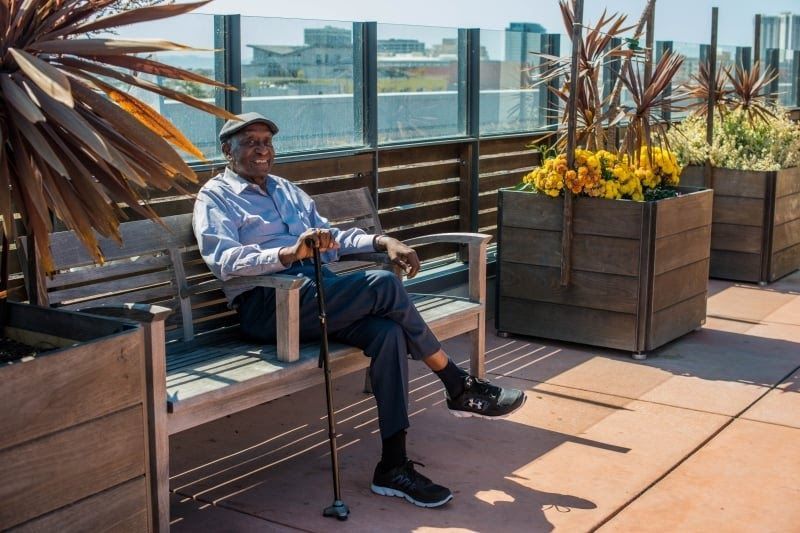Respite Care After Surgery
Learn about your options after hip, knee, or cardiac surgery. Seniorly can help you prepare for a more comfortable recovery with respite care after surgery.

Knee and hip replacements are common procedures that older adults undergo. According to University Hospitals, 700,000 knee replacement surgeries and 450,000 hip replacement surgeries are performed each year. Furthermore, women are more likely to be recommended for joint replacements than men, and the rate of joint replacements increases with age.
Additionally, thousands of people have cardiac surgery in the U.S. every day. The most common cardiac surgery, known as a coronary artery bypass grafting, occurs when a healthy artery or vein from another part of the body is connected to a coronary artery that is blocked. Other surgeries can repair or replace the valves that control blood flow through the heart by implanting devices, such as a pacemaker, or a donor heart can improve overall cardiovascular health.
All of these are major surgeries for which you will need significant time and support to recover. The more you know about your upcoming procedure, the more you can plan ahead and ensure a smoother recovery process.
What to expect post joint replacement
Joint replacement surgery itself is relatively short, and most people are able to move better with less pain after recovering from the procedure. Physical therapy can start as early as the same day of surgery, and you may be up and walking with assistance only one or two days later. It is likely that you will leave the hospital after only a few days, but full recovery can take 3 to 6 months depending on the type of surgery, your pre-surgery health, and the nature of your rehabilitation. Johns Hopkins Medicine and Midwest Orthopaedics provide more insight into what your recovery may look like after hip or knee replacement surgery, respectively.
Recovery from a joint replacement involves the right combination of rest, wound care, pain management, and physical therapy. A short term stay in a senior housing community before returning home can make the recovery period easier for both you and your primary caregiver.
What to expect post cardiac surgery
Immediately after surgery, you will most likely spend a day or two in the Intensive Care Unit and then several days in another part of the hospital. Doctors will monitor your heart rate, blood pressure, breathing, and incisions.
After discharge, there will be an initial period of recovery, and then a structured program of cardiac rehabilitation will help you return to an active life. The timing of these recovery steps will vary depending on your overall health and the type of surgery you had, but in either case, short-term care in senior housing can help.
During the post-surgery phase, it may be difficult to take care of yourself, and your caregiver may be unable to provide 24/7 care for you. However, with short-term respite care, the staff in senior housing can care for incisions, watch for signs of infection or other complications, and help you cope with the after effects of surgery such as muscle pain, chest pain, or swelling; they can also handle medication and pain management for you. With their help, you can focus on resting and regaining the strength you’ll need for rehabilitation.
Cardiac rehabilitation
Cardiac rehabilitation is a medically supervised program that may start a few weeks after your surgery. If you are at home, you will most likely go to an outpatient rehab center. In short-term care, your rehab can begin in the comfort of your room.
In addition to an initial medical evaluation and tracking your progress over time, your program will include:
- Exercise training. Physical training will start out slow. Your training will include cardiovascular exercises such as walking and cycling, as well as gentle strength training. In addition to your rehab program, your team will teach you exercises that you can continue on your own three to five times a week. These exercises are critical to your recovery, as they can help lower your risk for future cardiac problems.
- Education. Your team will work with you to develop a healthy diet, to manage pain and fatigue, and to learn about your medications.
- Counseling and support. Anxiety and depression are not uncommon after cardiac surgery, even among people who have never experienced them before. In fact, people who undergo joint replacement surgery have a higher likelihood of developing anxiety or depression; the reasons for this may be due to a prolonged pause in their independent and active lifestyle, a lack of sleep, or anxiousness about the procedure. To help prevent the onset of mental health conditions, your rehabilitation program will typically include stress management skills, counseling, and referral to other resources that can help manage the emotional challenges of recovery.
Respite care may make your recovery easier
With respite care, all the care you need will be located in one place. You’ll also learn skills to help you maintain balance and agility: get help with cleaning and dressing the wound, and have committed staff to manage your pain medications. Short-term care can help with activities of daily living that you may not be able to do on your own during this time, such as using stairs, dressing, making beds, or bathing.
Even if you have family and friends who can help you, they may not be available all of the time during your recovery. A short-term stay in assisted living can relieve caregivers of the stress of arranging care for you at home, and you will have the opportunity to focus on getting better.
Marlena del Hierro earned her Master of Arts degree in Gerontology from San Francisco State University and her Bachelor of Arts degree in Human Development from California State University. She also serves in an advisory capacity for Jukebox Health. Marlena is a vocal advocate for evolving the aging paradigm, and is a frequent contributor to public discussions about aging. She has served as a resource for media outlets like WGBH, FOX News, CNBC and the Today Show.
To learn more about Seniorly's editorial guidelines, click here.
Sign up for our Healthy Aging Handbook
Seniorly’s Senior Living experts created a comprehensive handbook to help people age happily while ensuring they love where they live. Enter your email address below to receive your copy and learn more about Healthy Aging and Senior Living.*
*By submitting your email address above, you consent to receive occasional email communications from Seniorly, including educational content and tips, newsletters, and other relevant updates and offerings. You can unsubscribe at any time and we will never sell or distribute your email address to a third party. You can view our Privacy Policy here.
